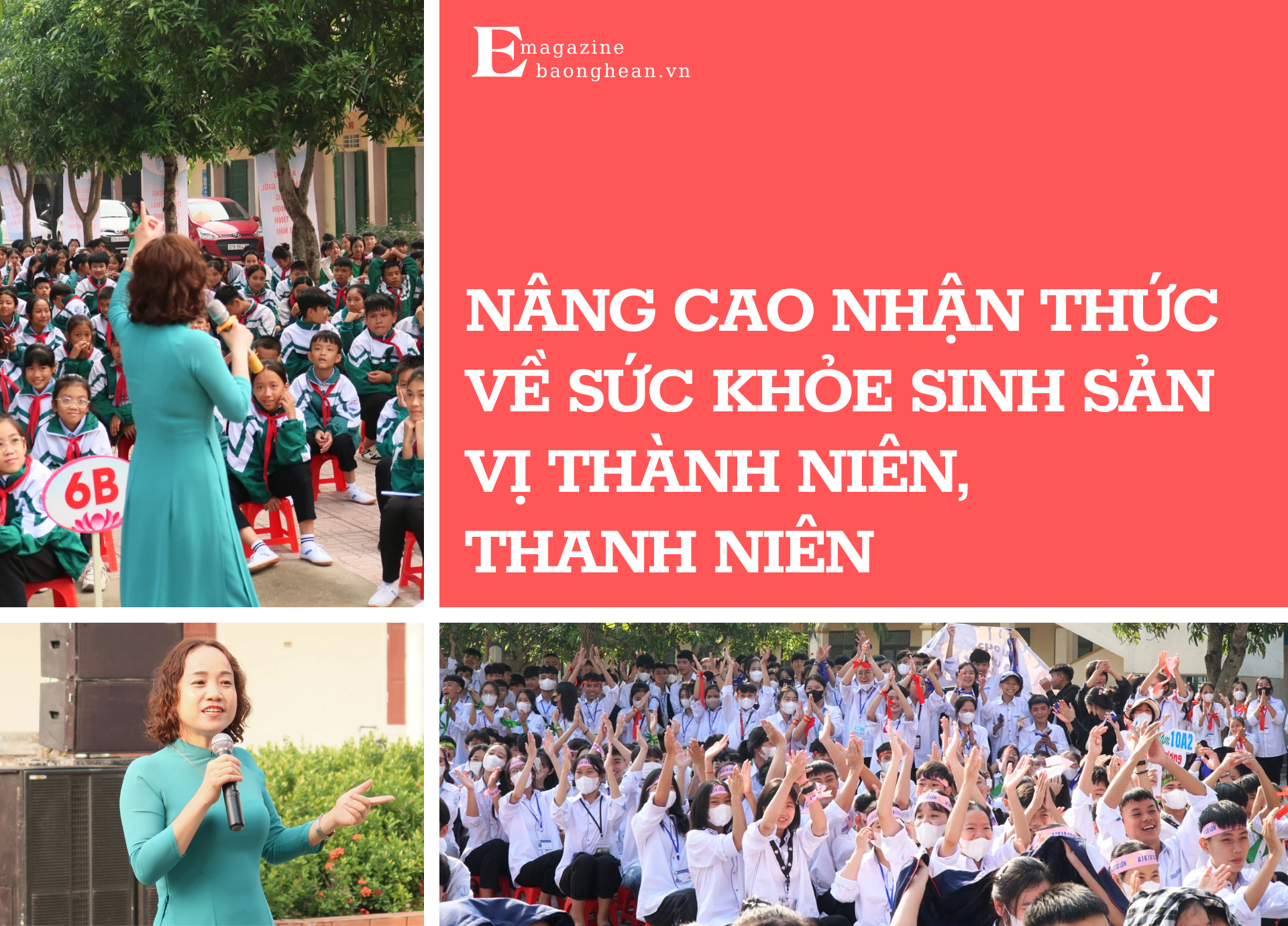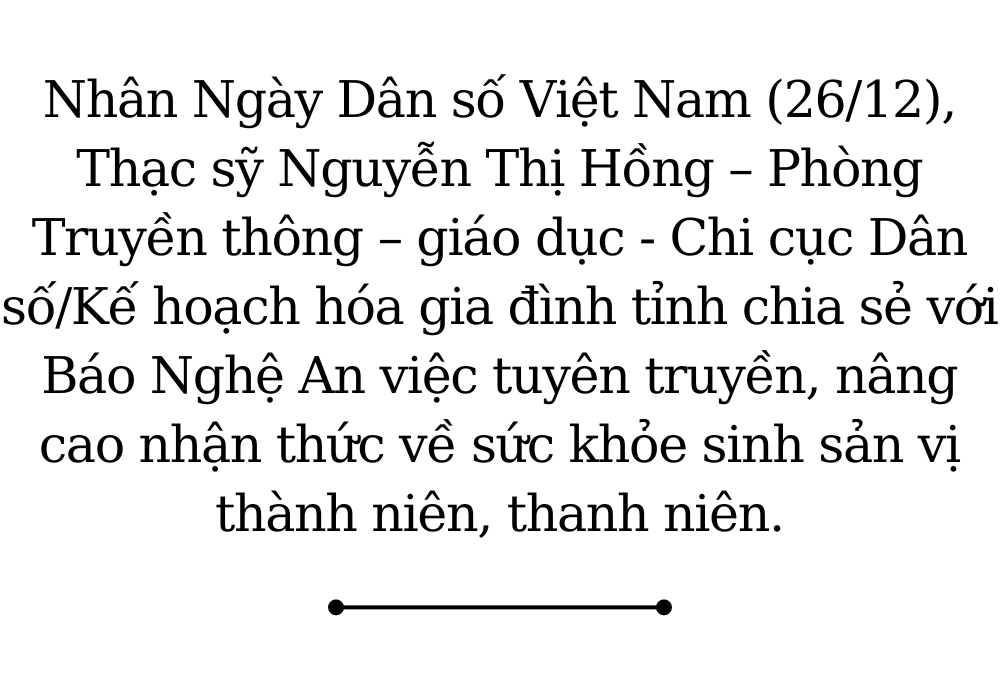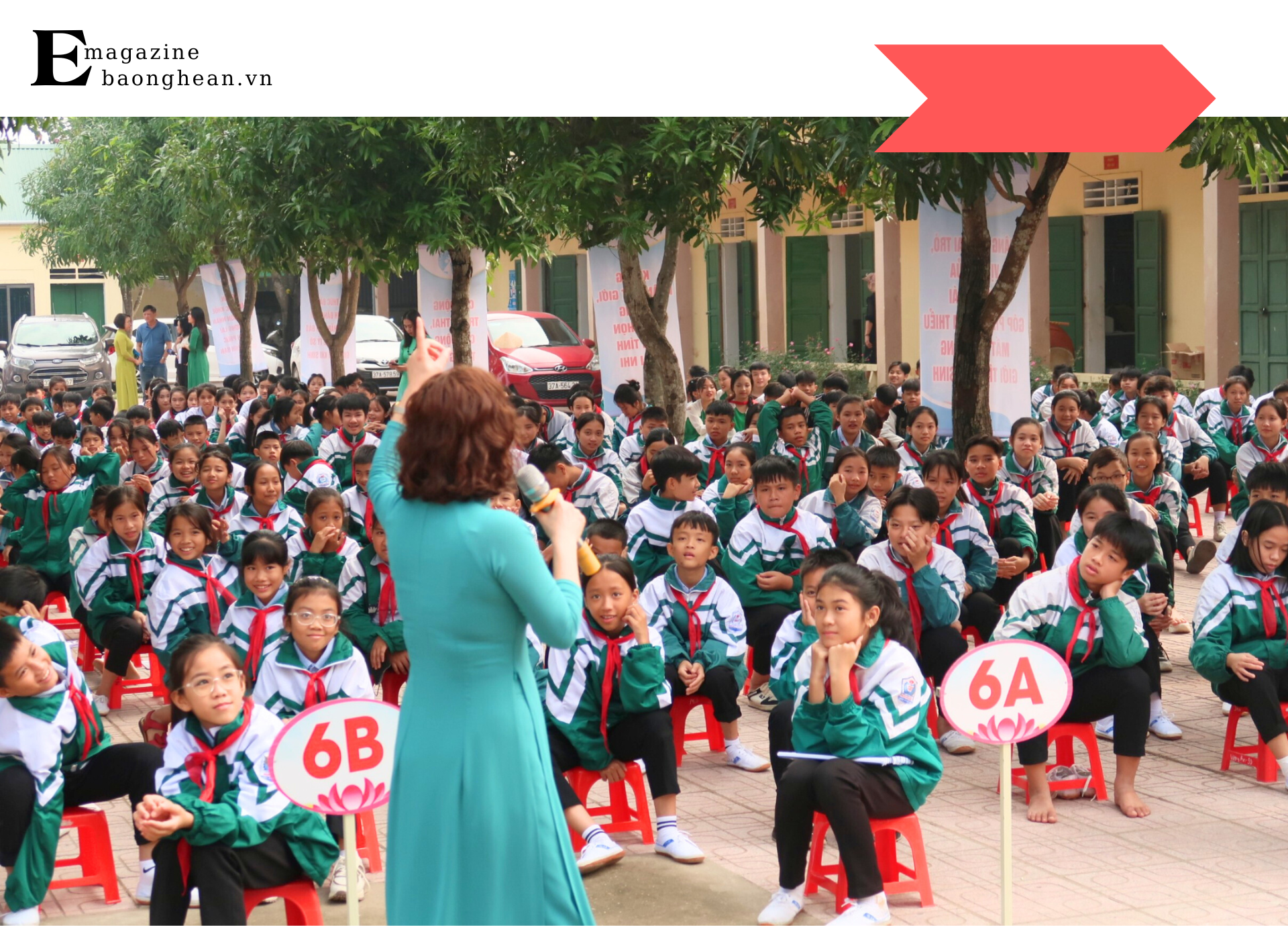

PV: December is the National Action Month on Population. Among many tasks, taking care of adolescent and youth reproductive health is identified as a very important task. And this is also the main theme of this year's National Action Month on Population, isn't it, Madam?

Ms. Nguyen Thi Hong:The National Action Month on Population in 2023 and Vietnam Population Day (December 26) have the theme “Participate in pre-marital health consultation and examination for family happiness and the future of the country”. This is a good and practical topic, because our Party and State are aiming to improve the quality of the population, and young people are the key group related to the future of the country.
In the current context, I think that paying attention to adolescents and young people is appropriate. Students going to school, in addition to learning knowledge from books, need to be equipped with many other skills, including reproductive health care skills for adolescents and young people. This is the age when they change physically, mentally, and physiologically, and if we do not help students understand and perceive these changes correctly, it will affect their lives, both psychologically and physiologically.

PV: As someone who has worked in population communications for adolescents and young adults for many years, there must have been many stories that made you think and worry along the way?
Ms. Nguyen Thi Hong:Up to this point, I can’t remember exactly how many schools we’ve been to or how many students we’ve met. There were a lot of happy things, but there were also some things that we’ll never forget.
The first story is about a Thai ethnic student who was studying at Quy Hop 3 High School at that time. Due to lack of knowledge, in grade 11 she had sex and became pregnant, giving birth while still in school. When we came to the school to communicate, she was leaving her child with her grandmother. Despite her special circumstances, we were surprised when, in the middle of the school yard with hundreds of students and teachers, she boldly stood up to share her story and expressed her determination to go to school to get a high school diploma.
However, this female student also shared very honestly, because for her "this is really difficult". She said that, if she had had the knowledge and skills before, she would not have had an unwanted pregnancy, her studies would not have been interrupted for a year and she would not have had to go back to school. Moreover, she would have gone to school with a more comfortable mindset, not having to bear the burden of raising a child and having to go to school at the same time. Through her story, she hopes that no one at school will make the same mistake to avoid unfortunate consequences.

Another case we encountered when implementing the integrated program of providing knowledge related to reproductive health care for students at schools. During the process of counseling and ultrasound for students, we discovered that some students were 3-4 months pregnant. In all these cases, we had to counsel them individually to minimize the impact on their health and future consequences.
PV: From the above stories, do you feel concerned about the lifestyle of students of the young generation, the current generation Z?
Ms. Nguyen Thi Hong:The concept of today's youth is quite different from that of previous generations. Of course, the way of life will also affect the psychological and physiological attitudes. In the past, people often lived slowly, did not express their feelings and love to the opposite sex clearly. However, the young generation now has a more open, modern and liberal concept of love and sex. Therefore, there is a risk of leaving many consequences. Reality also shows that although they have a more modern lifestyle, they are very subjective. Many do not share with their parents and are afraid to talk to their teachers.

Therefore, to keep up with the pace of life of today's young generation, we should not avoid it but need to speak carefully and deeply. There needs to be coordination between families, schools, departments, branches and organizations to join in propaganda to improve children's understanding.
In addition, it is necessary to equip students with skills about safe sex and unwanted pregnancies. Schools should establish clubs and have extracurricular activities to openly discuss this issue, to help students improve their knowledge and life skills.
PV: After many years of working in communications and contacting many schools, do you think schools today care about reproductive health issues for adolescents and young people?
GrandmaNguyen Thi Hong:Over the years, I have been in contact with many schools, many students, and teachers and have found that basically, schools support us when we mention the issue of communicating reproductive health to adolescents and young people. However, there are still some schools, including specialized schools, that are still very hesitant and they think that it is "drawing a path for deer to run". Many school leaders, especially at the secondary level, want us to use gentle terms when communicating to students of this age group, rather than speaking frankly and deeply. Personally, I think this point of view is a bit "old" and slow compared to the pace of life of today's youth. Moreover, if adults avoid it, young people will become more curious. And once they are left to explore it, it can lead to wrong actions, which is different from having the right orientation.

PV: When it comes to reproductive health communication, some people say that this is boring knowledge. But in reality, following you and your colleagues on communication trips, I see that students from many schools are very enthusiastic and actively participate. Is it because of the many innovations in communication methods?
Ms. Nguyen Thi Hong:Nghe An currently has nearly 500 schools at the secondary and high school levels and with a maximum of only 40 communication sessions per year, there will be schools that we can only return to once every 5 or 10 years, and schools with the most can only return 2-3 times. Not to mention, each time we return, the old generation of students have already graduated. Therefore, I can affirm that for those working in communication, the content can be repeated, but the audience is always new.
Furthermore, I think that, with communication work, the content can be similar in some aspects. But the leader can be flexible, depending on the audience. For example, with junior high school students, we can talk about gender awareness and body changes during puberty and skills to prevent sexual abuse. Meanwhile, with high school students, we focus on changes to help students perceive and orient themselves. To effectively propagate, we must delve into the specific characteristics of each school, each region, each area, each student group to have creativity and appropriate adjustments. Besides, to be attractive and lively, the role of the communicator is very important, that is, to combine communication work with the innovation work of the education sector. Let's consider students as the central audience, ask open-ended questions for them to answer and express their thoughts. This is also a way for us to understand our students and help them shine, train them to be confident, and develop their skills in front of a crowd.

The experience of years working as a Literature teacher and a homeroom teacher helps me understand the psychology of students. That also helps me have a variety of languages, information processing and flexibility in communication sessions. On the contrary, the conversations with students give me an opportunity to use the expertise of a teacher, to be able to complete the job in the best way.
PV: As a communications professional and a mother of two teenage daughters, can you share with parents your experience in guiding and educating children about reproductive health?
Ms. Nguyen Thi Hong:My children have been and are going through adolescence. For a mother, perhaps the most painful stage is when children enter puberty. Some people call this the “rebellious” stage. Over the years, facing these changes, I am willing to share with my children as a friend, confide in them, let them read books, open videos for them to listen to talks about experts. Even when times are difficult, I hold my children in my arms… Of course, what I say, I think, my children cannot grasp everything, but that is part of what I want to equip them with before they enter puberty, so that they are no longer confused.

From my own story, I think that fathers and mothers should accompany their children. In fact, if the media only stops at the student audience, it will only be 50% successful. The rest depends on parents and families. As a mother, a communicator and a teacher, I want to say that I hope students will be confident, modern young generations, they will understand and perceive correctly about the reproductive health issues of adolescents and young people. As for parents, be smart and wise to know what you need to do to help your children be healthy, happy and have a solid future.
PV:Thanks for joining the chat!.
